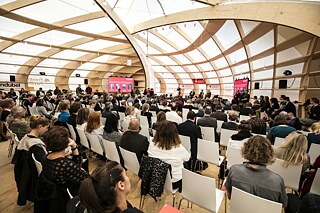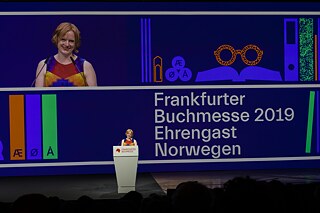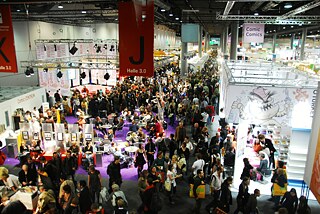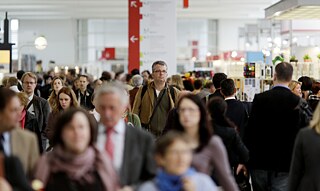Culture in the Quarter
The Frankfurt Book Fair Goes Online
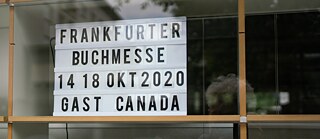
This year’s Frankfurt Book Fair was meant to have been the highlight of cultural exchange between Canada and Germany so far. Every year at the world’s largest trade fair of its kind – more than seven thousand exhibitors and around three hundred thousand visitors usually come together in Frankfurt within five days – one country has been the guest of honour and as such presented its literature.
By Andreas Platthaus
This tradition began in 1976 and this time, Canada was finally scheduled to be the guest of honour. It would even beat out the United States and Great Britain, because the only English-speaking guest countries as yet have been Ireland and New Zealand, although India was also featured in 1986 with several languages including English. Canada also offers multilingualism and Frankfurt was looking forward to both its French- and English-language literature. The fair went very well in 2017 when France was the guest of honour.
An impressive sign of solidarity
Now, though, the coronavirus pandemic has thwarted the wonderful Canadian plans – and those of the whole fair. Initially, the Frankfurt Book Fair was still supposed to take place in October, but when they realised that it would be a mere shadow of its usual self, the event was cancelled on 8 September. At best, one quarter of the exhibitors of the previous year would have attended and the number of visitors would not have even reached a quarter of last year’s due to the necessary health measures. International publishers would hardly have been represented at all, and Canada, which had been preparing for the fair for years, would have had to completely cancel if the book fair had not already offered in June to postpone it until next year. The next guests of honour, already confirmed – Spain, Slovenia and Italy – each agreed to postpone their appearances by one year. That was an impressive sign of solidarity with Canada, because these countries have long since begun preparations for their Frankfurt presentations. A multimillion-dollar programme, as is now common in the guest of honour countries, is an organisational challenge.Canada intended to send almost one hundred authors to Frankfurt. When it became clear that it couldn’t be done due to the pandemic, there were initial speculations of transferring all of the planned readings to the Internet. However, experiences with streaming and video podcasting over the past few months has led to audience fatigue and the immediacy of a live reading cannot replace even the most imaginative on-camera appearance. So, both the Book Fair and the Canadian organising committee were very relieved that they would get another chance in October 2021. At the moment, however, we can only hope that the pandemic will be over by then. The preparations for next year’s guest country appearance will also remain a risky gamble. Still, much more depends on Canada’s immediate presence in Frankfurt than just the pleasure of hearing all the authors who will have travelled there. As every year, German publishers have had many books from the guest country translated because such projects receive financial support. Relevant plentiful German and Canadian funding had been approved in advance, especially since literature of English and French-speaking origin is very popular in Germany. Now the books have arrived, but autumn’s popular guest country appearance – that otherwise would have ensured that the translations received plenty of attention in the German media – will be lacking. In the last few months, more than a hundred new publications of Canadian literature have hit German shops, and by October there will be as many more. For the publishers of all these books it is of fundamental importance that a classic guest country appearance follow in the coming year.
However, with the postponement to 2021, this year’s book fair, which was already pared down, also lost its core. With far fewer exhibitors and none of the usual readings and encounters with authors at the publishing stands there was barely anything to lure paying visitors into the halls. Accordingly, it was only logical to cancel the fair entirely. The only remnant of this year’s plans is now a reading day in the Frankfurt Festhalle, a huge historic domed building that is part of the exhibition grounds. Normally it seats up to thirteen thousand people at concerts, but no more than a few hundred guests are now allowed into the hall. Further events will take place across the city of Frankfurt, but will be less numerous than usual because there are no foreign authors. The usual international flair of the book fair will not be noticeable this year.
Most German authors happen to live in Berlin
And that’s not all. The most prominent author’s stage, the “Blue Sofa” where talks with writers take place nonstop during the fair days, will be set up in Berlin this year because even domestic guests weren’t expected to travel to Frankfurt – and most German authors happen to live in Berlin.Despite its daring, the Frankfurt Book Fair is now at risk of a debacle. Exhibitors and literature fans will notice that they needn’t visit the exhibition grounds to conduct their usual business or to listen to readings. The director of the book fair, Juergen Boos, has already announced that the event will never be able to return to its former style. Canada must be aware that its guest country appearance, postponed by a year, will not only be endangered by a possibly yet-ongoing pandemic, but also by the loss of importance of the Frankfurt Book Fair.

